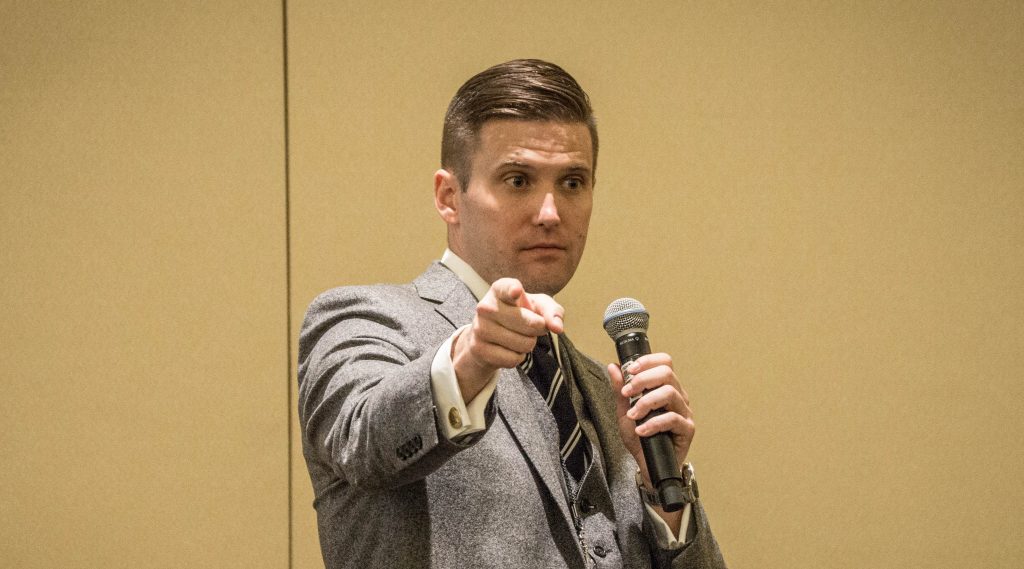Over a year ago, the “alt-right” came suddenly into public view in the United States. Initially, it was a primarily online movement increasingly dominated by white nationalist ideologues. In mid-August, they joined offline with neo-Nazis and Klansmen at “Unite the Right,” a rally-turned-brawl in Charlottesville that ended with the killing of Heather Heyer.
After Charlottesville, public condemnation of “hate groups” was rightly intense. And yet the international reach of the alt-right continues to grow. If we worry about the future, it is not enough simply to protest “hate.” We must analyze and answer the beliefs that make such a movement seem acceptable, even attractive.
Richard Spencer, who coined the term “alt-right,” frequently calls for rational discussion of his positions. To respond effectively, we must heed his call and critique his principles. In making racial identity the foundation of an individual’s humanity, Spencer’s “identitarianism” is intrinsically inclined toward violence. Treating our common humanity as irrelevant to the question of identity, he sets himself in dramatic opposition to the intellectual roots of the “Western” civilization to which he lays claim.
Race as the Foundation of Identity
Start your day with Public Discourse
Sign up and get our daily essays sent straight to your inbox.In his most popular YouTube video, Spencer asks: “Who are you?” For him, who we are is deeper than personal preference, parenthood, or place of origin. “Ultimately,” he averred in December at Texas A&M, “whether you like it or not,” you are “part of a race.” Race, for Spencer, is deeper than color. It is culture, history, and the genetic community within which these have been sustained. Genetic continuity is necessary; purity is not. A race, he explains, is a “people and [its] spirit,” a “bigger extended family” with its own “story to tell.” Nothing is deeper than race. It is the “foundation of identity,” the “root” and “base, where you can’t go any further.” To know one’s race is to know oneself.
Who, then, is Spencer? He is of “the peoples, history, spirit, and civilization of Europe,” a race that began “in the Greek and Roman world,” grew into an empire, and was sustained by a now-superseded Christianity. (Spencer is an atheist).
As he sees it, today’s multiculturalist zeal for equality threatens all races, but especially that of Europe. This “great erasure,” to his mind, is stripping whites down to un-persons, “without identity and without meaning” in “the ruins of the postmodern world,” where they live on “through debt, Snapchat, porno, and Prozac” in “a future worse than extinction.”
Against this fate, Spencer seeks a North American “white ethno-state” in which the pan-European race might again flourish. For, he says, only race can give one a destination or “telos,” an “ideal” that “channels our energies” to “reach the stars” and “risk everything for ends that are super-human.”
Yet is Spencer’s racial vision at home in the tradition of European civilization that he invokes? Many of Spencer’s critics cite democracy, capitalism, and human rights as historically European developments that are not definitively “European” but, as universal values, can be the property and greatness of all. Spencer derides these developments as the “buzzwords” of an “abstract universalism” that itself expresses nothing deeper than the mere fact of our common participation in a globalized economy. As principles of identity, they leave us “rootless,” “wanderers” in a land that has become “just another place to go shopping.” Peaceful consumerism, he contends in his video, is not what defined Europe or drove its greatness: “Man does not live, and man does not die for abstractions.” Europeans have lived and died not for freedom and shopping, he claims, but for race. This is who we are. This spirit of conquest has brought forth the great cultural and technological achievements of Western civilization.
One can readily wish to affirm that every person is more than his or her possessions, preferences, purchases, and even friendships; that who we are transcends the contingent life circumstances of social status and material achievement by which a consumerist culture would measure us; that there must be some ideal to direct us upward, to something greater. And yet something is missing, something dangerously overlooked, in Spencer’s “race.”
We find this in our own experience. Although the life, experience in society, and suffering of another cannot be one’s own, and although the distinctive cultures and “stories” of which Spencer speaks exist, the fact remains that every one of us is shaped by our interactions with the people we encounter. An Italian child meeting a Nigerian for the first time, a Bavarian exchange student making friends during a high school year spent in Michigan’s upper peninsula, and, yes, Spencer’s own high school friendship with an African-American student—through relationship, we transform one another.
Alt-right identitarianism cannot account for this capacity as a necessary dimension of who we are. It cannot account for how, across culture and “race,” such meetings might be anything better than dilution or even degradation of one’s identity. Yet within the Western tradition that Spencer invokes—indeed as a fundamental tenet of that tradition—others have reflected on the basis and significance of personal and cultural transmission.
A Deeper Foundation for Identity
Spencer may be right that consumerism did not drive Western civilization, but he is wrong that race did. His video hints at another account of who we are. Just as he speaks of culture, history, and destiny, the camera lingers on a bust of Socrates, himself a wellspring of Western thought. Like Spencer, Socrates also asked “Who are you?” and urged that one “be less concerned with what you have than with what you are.”
Socrates, however, discovered a foundation of identity that is deeper than race. According to philosopher Pierre Hadot, for Socrates, the “real problem” is one “of being in this or that way.” In the Apology, Socrates would have you question yourself and ask whether you “take thought for wisdom and truth and the perfection of your soul.” Above reputation, honors, and role in one’s city, one must seek to “care for himself and his own perfection in goodness and wisdom.” Socrates lives and indeed dies to improve his city by inquiring into how to be human, as something that runs throughout and beneath one’s life as an Athenian. To know that one is Athenian is not enough.Socrates goes deeper than Spencer’s racial foundation. Only within a life that examines its own humanity can one’s observance of the Athenian laws and pieties lead to greatest excellence. Without questioning oneself as human, one cannot truly know oneself.
But Socrates does not attempt to define humanity in a vacuum. Culture, society, and individual experience are not for him a husk that must be discarded to reveal the human kernel. They are the forms through which humanity is lived, by which it is conditioned, and through which it is known. They cannot be negated or erased.
Therefore, even as the Socratic tradition rejects race and culture as the deepest foundation of identity, it does not reduce the good society to an easy globalism of individual autonomy and material prosperity. A society can never be “just another place to go shopping,” a perpetually self-displacing culture of fad and fashion, because authentic humanity involves moral goods that are actualized and encountered through individual experience and cultural community.
Yet humanity remains the ground of these forms and, as its potentialities exceed any particular formation, distinct human lives can never be absolutely unintelligible to one another, never essentially inaccessible to one another, however much they may differ. Our identity matures in human conversations that, precisely because the participants are human, remain possible—however difficult—between as well as within cultures. One has always something more to learn from others. One lives more fully humanly by those searching dialogues wherein, as Hadot puts it, human beings come to “discover their inner possibilities,” even those human realities that this or that particular life or culture leaves hidden. Socrates therefore converses freely with politicians, poets, craftsmen, and slaves because at the heart of his project is the confidence that human dialogue is able to reach a fundamental human truth.
It is a truth lived (he hopes) through cultures and by peoples, but a truth that even so transcends these and in light of which they must be judged. Thus, in the Meno, Socrates asserts that “both man and woman, if they are to be good, require the same qualities of justice and moderation” such that “all humankind are good in the same way; for they become good when they acquire the same qualities.” Humanity is no after-the-fact abstraction. These potentials and their various actualizations in the concrete circumstances of one’s life are what make a human being most deeply who he or she may be.
This is the “spirit” and ideal of the Western tradition—to value the contingent as the context of our lives, while looking through the contingent to pursue a universal excellence. This quest is what Socrates believed could make a human being and a society truly great.
In European civilization, this spirit was nourished in what historian Rémi Brague calls an “eccentric identity” that refused to absolutize its own culture or race. Western civilization “use[d] its knowledge of the foreign . . . to understand itself by becoming conscious of the non-obvious character of its [own] cultural practices.” Thus the Romans eagerly borrowed from the Greeks. Christendom received from the Jews, the pagans, the Muslims, and the Far East. Brague sees colonialism as a decline, when Europe’s “eccentric identity” was overshadowed by a “desire to compensate, through the domination of people it pretends are inferior, for its own feeling of inferiority in relation to classical antiquity.”
The true “spirit” of Europe, then, is not racial. Its “eccentricity” is given focus in the Socratic conviction that humanity is the deepest common foundation of who we are. Such humanism is inseparable from the Western tradition.
The Violence of Alt-Right Ideology
Like the long history of American racism, the Charlottesville rally betrays this inheritance. Despite the organizers’ protestations, no dialogue about identity could have taken place there because the “identitarian” ideology of the alt-right does not acknowledge humanity itself as relevant to the question. For Spencer himself, homo sapiens as a whole is at best a collection of “seemingly intelligent primates.”
Small wonder that, in a recent psychological study measuring “dehumanization,” self-identified alt-right participants voluntarily rated whites, on average, as 91-percent fully evolved humans, with Europeans at 87 percent, Jews at 73 percent, and blacks at 65 percent (just between homo erectus and Neanderthals on the test’s visual scale). For them, there is no point interacting with those sub-human others. Such conversations are not just irrelevant; they are self-destructive.
Here we come to violence. For alt-right identitarianism, when one’s identity is challenged by another or when demographic trends threaten one’s “race,” one stands to lose what is deepest in “who I am.” Yet what reply can there be if shared humanity is an irrelevant abstraction? It cannot justify a dialogue with others that, in any case, would be useless to the discovery and actualization of one’s own racial identity. There is nothing left but to rebuff the existential threat that the other’s opposition must entail.
For the alt-right, violence must always remain an option, a natural extension of the imperative to preserve “who I am” through the existence and visibility of my racial identity. When Spencer muses that the birth of a white “ethno-state” might be “horribly bloody and terrible,” we can grasp the conceivability of such a path in the ideology he has created.
Near the end of his video, Spencer declares, “what our ancestors took for granted, we must discover, we must renew.” Despite himself, he is right. For when the question of what we live and die for is reframed in a way that makes our common humanity irrelevant to our answers, then we have already opened the way for human speech to be drowned out by the sound of an automobile colliding with dehumanized flesh.













